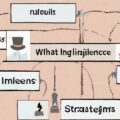What Is Emotional Intelligence and Why Does It Matter?
Emotional intelligence (EI) refers to your ability to recognize and understand emotions, including your own, and use that information to guide your thinking and behavior. EI is crucial for effectively navigating personal and professional relationships.
People with high EI are better able to empathize with others, handle stress, overcome challenges, resolve conflicts, and achieve success. Developing your EI can help you build stronger, more rewarding relationships, achieve goals, and lead a more fulfilling life.
35 Inspirational Quotes on Emotional Intelligence
Here are 35 quotes that provide thoughtful perspectives on the value of emotional intelligence and self-awareness:
1. “Emotional intelligence is your ability to recognize and understand emotions in yourself and others, and your ability to use this awareness to manage your behavior and relationships.”
2. “When dealing with people, remember you are not dealing with creatures of logic, but with creatures of emotion.” – Dale Carnegie
3. “Emotional intelligence is the ability to sense, understand, and effectively apply the power and acumen of emotions as a source of human energy, information, connection, and influence.” – Justin Bariso
4. “Self-awareness includes awareness of one’s emotions. A person needs to perceive emotions accurately in oneself before he or she can move to the next step of using them as signals.”
5. “Emotions can get in the way or get you on the way.” – Mavis Mazhura
The Importance of Self-Awareness
Self-awareness is key to developing strong EI skills. Here are some quotes on the value of knowing oneself:
6. “Self-awareness includes awareness of one’s emotions. A person needs to perceive emotions accurately in oneself before he or she can move to the next step of using them as signals.”
7. “Listen to your body. Listen to your heart. Listen to your soul. They know better than you.”
8. “To be yourself in a world that is constantly trying to make you something else is the greatest accomplishment.” – Ralph Waldo Emerson
On Self-Regulation and Self-Control
Once you understand your inner landscape, you can start to intentionally guide your thoughts, emotions and behaviors:
9. “Managing emotions is understanding that your feelings do not control your life, your response to them does.” – Tony Robbins
10. “The mark of a great man is one who knows when to set aside the important things in order to accomplish the vital ones.” – Brandon Sanderson
11. “I am the master of my emotions.”
The Social Side of Emotional Intelligence
Emotional intelligence also involves effectively navigating relationships and social dynamics:
12. “Never underestimate the power of emotions to undermine relationships.”
13. “People with high EI can manage emotion, build trust, improve decision-making, and communicate effectively.”
14. “Social skill is the ability to get along well with others in day-to-day activities.”
Achieving Goals with Emotional Intelligence
Your ability to understand and channel emotions can help you achieve your dreams:
15. “Passion fuels motivation, it is emotion channeled toward a goal.”
16. “I am focused. I feel empowered. I am achieving my goals.”
17. “Once we believe in ourselves, we can risk curiosity, wonder, spontaneous delight, or any experience that reveals the human spirit.” – E.E. Cummings
Overcoming Challenges
Emotional intelligence also provides fuel for pushing through tough situations:
18. “Courage is not the absence of fear but the ability to act in the presence of it.”
19. “Success in life is not for those who run away from problems, but for those who meet their challenges head on, understand them, then overcome them.”
20. “Every champion was once a contender that refused to give up.” – Rocky Balboa
The Journey of Growth
Developing EI is a lifelong process, but an incredibly rewarding one:
21. “Knowing yourself is the beginning of all wisdom.” – Aristotle
22. “The most beautiful people we have known are those who have known defeat, known suffering, known struggle, known loss, and have found their way out of the depths. These persons have an appreciation, a sensitivity, and an understanding of life that fills them with compassion, gentleness, and a deep loving concern. Beautiful people do not just happen.”– Elisabeth Kubler-Ross
23. “You cannot teach a man anything. You can only help him find it within himself.” – Galileo Galilei
The Ripple Effects
As you grow in emotional intelligence, you lift up those around you as well:
24. “A good head and a good heart are always a formidable combination.” – Nelson Mandela
25. “I define connection as the energy that exists between people when they feel seen, heard, and valued.” – Oprah Winfrey
26. “Wherever there is a human being, there is an opportunity for a kindness.” – Seneca
Wellbeing and Emotional Intelligence
There is a strong link between emotional health and overall wellness:
27. “The best and most beautiful things in this world cannot be seen or even heard, but must be felt with the heart.” – Helen Keller
28. “Happiness depends upon ourselves.” – Aristotle
29. “The part can never be well unless the whole is well.” – Plato
Bringing It All Together
A few final thoughts on the power of emotional intelligence:
30. “Emotional intelligence begins with what is happening inside of you, then spreads to others and your environment.”
31. “To handle yourself, use your head; to handle others, use your heart.” – Eleanor Roosevelt
32. “Emotional intelligence is the key to both personal and professional success.”
FAQ
What are the 5 components of emotional intelligence?
The 5 main components of emotional intelligence are:
- Self-awareness – understanding your own emotions
- Self-regulation – managing your emotional responses
- Motivation – using emotions to achieve goals
- Empathy – sensing the emotions of others
- Social skills – managing relationships
How can I improve my emotional intelligence?
Some tips for improving EI include practicing self-reflection, managing stress through healthy outlets like exercise, developing empathy by listening closely to others, challenging limiting beliefs, and expanding your emotional vocabulary.
Why is emotional intelligence more important than IQ?
While IQ contributes to professional success, emotional intelligence plays a larger role in personal well-being and relationships. Many high-IQ people still struggle with happiness, stress management, and connecting with others.
What are 5 key aspects of emotional intelligence?
The 5 key aspects of emotional intelligence are:
- Self-awareness
- Self-regulation
- Social skills
- Empathy
- Motivation
How do you practice emotional intelligence?
To practice emotional intelligence: check in with yourself daily, name your feelings, breathe through tough emotions, set boundaries, unplug from technology, nurture positive relationships, volunteer, try new activities, and express gratitude.









